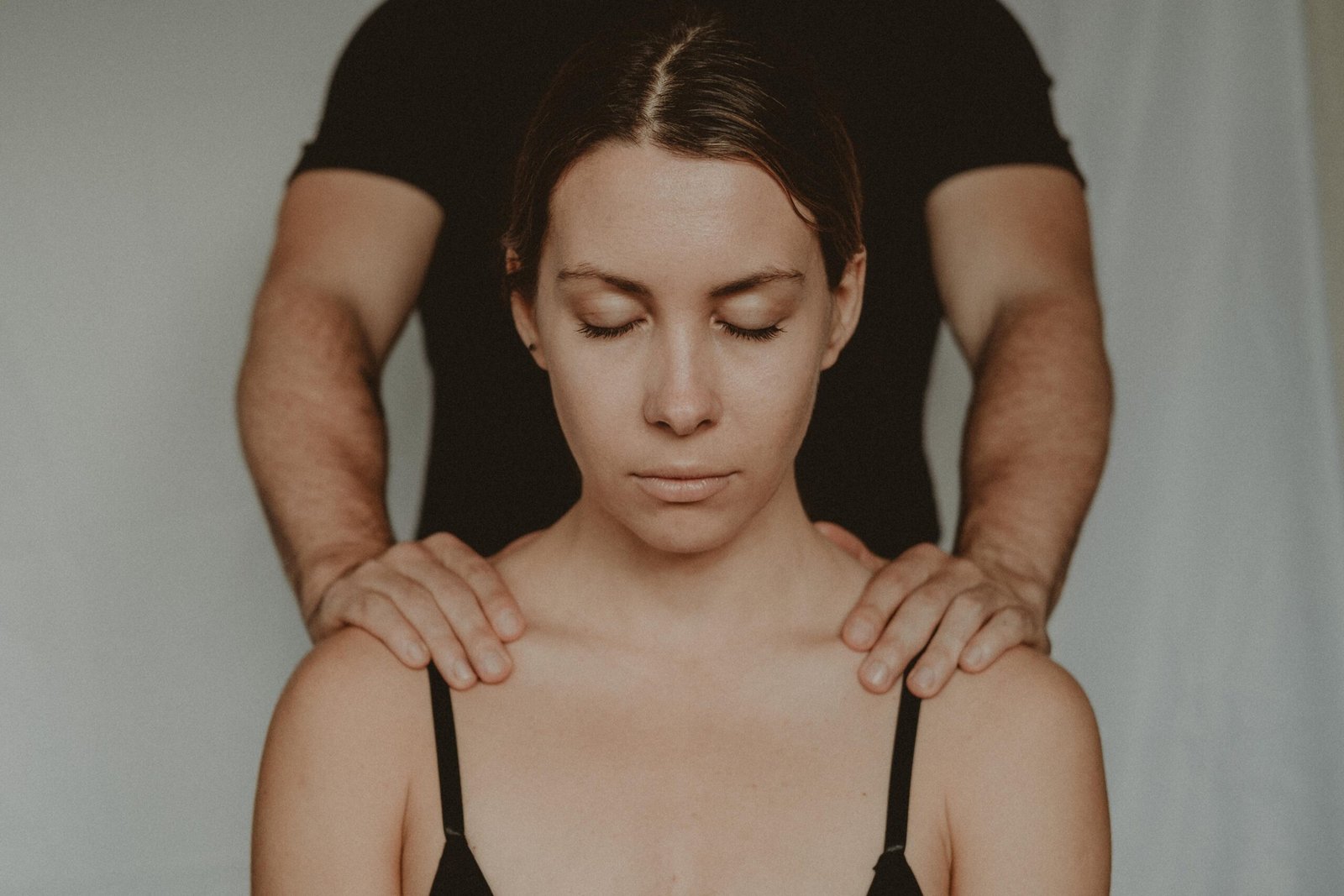
Imagine this: you’re on a long flight, cozying up in your seat with a soft blanket, and as you drift off to sleep, you find yourself leaning comfortably against the shoulder of a fellow passenger. Surprisingly, this impromptu slumber on a stranger’s shoulder brings a unique sense of comfort. In this article, we explore the unexpected tranquility found in the act of sleeping on someone’s shoulder, uncovering the soothing essence it brings amidst the bustling world of travel.

Benefits of Sleeping on the Shoulder
Promotes better sleep
Sleeping on the shoulder can promote better sleep by providing a sense of comfort and security. This sleeping position allows you to rest your head on a supportive surface, which can help to align your spine and reduce any strain on your neck and back. By finding a position that allows you to relax and feel at ease, you can fall asleep faster and enjoy a more restful night’s sleep.
Relieves stress and anxiety
Sleeping on the shoulder can offer relief from stress and anxiety. When you rest your head on someone’s shoulder, you may experience a sense of emotional support and connection. This physical closeness can help to reduce feelings of loneliness and soothe a racing mind. The comforting presence of a loved one can create a safe space where you can let go of your worries and unwind, promoting a deeper sense of relaxation that can contribute to a peaceful sleep.
Reduces snoring and sleep apnea
Sleeping on the shoulder may help to reduce snoring and sleep apnea symptoms. When you sleep on your side with your head resting on your partner’s shoulder, your airways can remain more open than if you were lying flat on your back. This can prevent snoring and alleviate symptoms of sleep apnea, such as interrupted breathing during sleep. By supporting healthy airflow, sleeping on the shoulder can lead to quieter nights and potentially improve your overall sleep quality.
Improves circulation
Sleeping on the shoulder can also improve circulation throughout your body. By elevating your head and neck, this sleeping position can enhance blood flow to your brain and promote better oxygenation. Improved circulation can also benefit your extremities, reducing the risk of numbness or tingling sensations in your arms and legs. As a result, you might wake up feeling more refreshed and energized.
Enhances intimacy and bonding
Sleeping on the shoulder can enhance intimacy and bonding between partners. Sharing this vulnerable and comforting moment can strengthen emotional connections and foster a sense of trust. The act of resting your head on your partner’s shoulder can create a feeling of closeness and security in your relationship. This physical contact can release hormones like oxytocin, which promotes feelings of attachment and love. By choosing to sleep on the shoulder, you can deepen the intimacy in your relationship and promote a sense of emotional well-being.
Precautions and Considerations
Ensure proper positioning
When sleeping on the shoulder, it is crucial to ensure proper positioning to avoid discomfort or strain. Make sure to align your head, neck, and spine in a neutral position to maintain healthy blood flow and prevent any unnecessary pressure on your joints. Experiment with different pillow heights and firmness levels to find the perfect balance of support and comfort for your body.
Choose a comfortable sleeping partner
Sleeping on someone’s shoulder requires the presence of a willing and comfortable sleeping partner. Ensure that your partner is open to this sleeping position and that they have no discomfort or issues accommodating your head on their shoulder. Communication is key, so discuss your preferences and comfort levels to ensure a peaceful and pleasant sleep for both parties involved.
Be aware of potential neck and shoulder strain
While sleeping on the shoulder can provide numerous benefits, it is essential to be aware of potential neck and shoulder strain. If you consistently experience discomfort or pain in these areas, consider using additional pillows or adjusting your sleeping position to alleviate any pressure or tension. Listen to your body’s cues and make adjustments as necessary to ensure a comfortable sleep.
Consult a healthcare professional if experiencing discomfort
If you experience persistent discomfort or pain while sleeping on the shoulder, it is advisable to consult a healthcare professional. They can evaluate your specific situation and provide personalized recommendations or treatment options to address any underlying issues or concerns. Seeking professional advice can help ensure that you prioritize your health and well-being while still enjoying the benefits of sleeping on the shoulder.

Sleeping Positions on the Shoulder
Lying directly on the shoulder
One sleeping position on the shoulder involves lying directly on your partner’s shoulder. This position allows you to rest your head against their upper arm, providing a comfortable surface to support your neck and head. This position can foster a sense of intimacy and closeness while still offering the benefits of sleeping on the shoulder.
Using the partner’s shoulder as a pillow
Another sleeping position involves using your partner’s shoulder as a pillow. In this position, you can rest your head directly on their shoulder, with their shoulder acting as a supportive and cushioning surface. This position can be particularly beneficial for relieving stress and anxiety, as the closeness and physical contact can create a sense of emotional comfort.
Cradling head on the shoulder
Cradling your head on your partner’s shoulder is another sleeping position on the shoulder that can provide both support and comfort. In this position, you can rest your head in the crook of their neck and shoulder, allowing for a natural alignment of the head, neck, and spine. This position can promote better sleep quality and reduce the risk of neck and shoulder strain.
Sleeping with arms around the shoulder
Sleeping with your arms wrapped around your partner’s shoulder is a cozy and intimate sleeping position. This position not only allows you to rest your head on their shoulder but also provides a sense of security and closeness. It can create a deep sense of connection and help foster a stronger bond between partners.
Best Shoulder Pillow Options
Memory foam pillows
Memory foam pillows are an excellent option for sleeping on the shoulder due to their ability to contour to your specific shape and provide optimal support. These pillows offer pressure relief and can help align your head, neck, and spine, allowing for a more comfortable sleep. Additionally, memory foam pillows are often hypoallergenic and resistant to dust mites, making them suitable for individuals with allergies.
Adjustable pillows
Adjustable pillows allow you to customize the firmness and height to suit your preferences and needs. These pillows often feature removable inserts or layers that can be added or removed to adjust the pillow’s loft. By personalizing the pillow’s height and firmness, you can find the perfect level of support and comfort for sleeping on the shoulder.
Contour pillows
Contour pillows are specifically designed to align with the natural curves of your head, neck, and shoulders. These pillows often have a curved shape, with a higher loft on one side to support the neck and a lower loft on the other side for the head. Contour pillows can help maintain proper spinal alignment while sleeping on the shoulder, reducing the risk of discomfort or strain.
Wedge pillows
Wedge pillows are triangular-shaped pillows that can be used to elevate your upper body, including your shoulders. By providing this elevation, wedge pillows can promote better breathing and reduce acid reflux or heartburn symptoms, which can interfere with your sleep. When sleeping on the shoulder, a wedge pillow can add an extra level of support and comfort.
Travel pillows
For those who enjoy sleeping on the shoulder while traveling, travel pillows can be a convenient option. These pillows are often smaller in size and designed to provide support and comfort while on the go. Choose a travel pillow that offers proper neck and shoulder support to ensure a comfortable sleep even when away from home.

Tips for a Comfortable Sleep on the Shoulder
Maintain proper head and neck alignment
To achieve a comfortable sleep on the shoulder, it is essential to maintain proper head and neck alignment. Ensure that your head is not tilted too far forward or backward, as this can strain your neck and lead to discomfort. Aim for a neutral alignment where your head is aligned with your spine, allowing for a more restful sleep experience.
Use additional support for the body
In addition to supporting your head and neck, consider using additional support for your body while sleeping on the shoulder. This can include using pillows or cushions to support your back, hips, and knees, depending on your sleeping position and any specific areas that require extra support. By providing adequate support for your entire body, you can minimize pressure points and maximize comfort.
Choose appropriate bedding materials
The choice of bedding materials can greatly impact your comfort while sleeping on the shoulder. Opt for breathable and hypoallergenic materials like cotton or bamboo to prevent overheating or allergic reactions. Additionally, consider using a mattress topper or mattress pad that provides cushioning and support, enhancing your overall comfort and sleep quality.
Find the optimal shoulder position
Experiment with different shoulder positions to find the one that offers the most comfort and support for you. Some individuals may prefer resting their head closer to the neck, while others may find more comfort by placing their head on the outer part of the shoulder. Listen to your body and adjust your position accordingly to ensure a restful and comfortable sleep.
Experiment with different sleep positions
While sleeping on the shoulder can offer numerous benefits, it’s essential to keep in mind that one position may not be suitable for every night’s sleep. It’s a good idea to experiment with different sleep positions, including sleeping on your back or side, to ensure that you find the most comfortable position for you. Variety can help avoid any potential muscle imbalances or strain from consistently sleeping on the shoulder.
Frequently Asked Questions
Is sleeping on the shoulder beneficial for everyone?
Sleeping on the shoulder may not be beneficial for everyone, as individual comfort and preferences can vary. Some people may find this position uncomfortable or experience shoulder or neck pain. It’s essential to listen to your body and choose a sleeping position that feels most comfortable and supportive for you.
How to prevent shoulder pain while sleeping?
To prevent shoulder pain while sleeping, it’s crucial to support your shoulder and maintain proper alignment. Choose a pillow that provides adequate support and elevation for your head and neck, ensuring that your shoulder is not excessively compressed or strained. Additionally, applying heat or cold therapy to your shoulder before bed can help alleviate any existing discomfort and relax your muscles.
Can sleeping on the shoulder cause nerve damage?
Sleeping on the shoulder itself is unlikely to cause nerve damage. However, if you consistently experience numbness, tingling, or weakness in your shoulder or arm while sleeping on the shoulder, it may be a sign of an underlying issue, such as a pinched nerve or nerve compression. In such cases, it is advisable to consult a healthcare professional for proper evaluation and diagnosis.
What if my partner is uncomfortable with me sleeping on their shoulder?
Respecting your partner’s comfort and boundaries is crucial in any relationship. If your partner is uncomfortable with you sleeping on their shoulder, it’s important to find alternative sleeping positions that can still provide a sense of closeness while respecting their preferences. Communication is key, so have an open and honest conversation to find a compromise that ensures both of you are comfortable and can enjoy a restful sleep.
Should I seek medical advice if I experience shoulder pain?
If you experience persistent or severe shoulder pain, it is recommended to seek medical advice. A healthcare professional can evaluate your symptoms, conduct a thorough examination, and provide an accurate diagnosis. They may also recommend appropriate treatment options or refer you to a specialist, such as an orthopedic doctor or physical therapist, for further evaluation and management of your shoulder pain.
Cultural Significance of Sleeping on the Shoulder
Symbol of trust and closeness
Sleeping on the shoulder holds deep cultural significance as a symbol of trust and closeness between individuals. It represents a level of intimacy and connection that is based on mutual comfort and vulnerability. This sleeping position can convey a sense of emotional support and security and is often considered a cherished experience in many cultures.
Expression of affection
Sleeping on the shoulder is also seen as an expression of affection in various cultures. It is a physical display of love and care, symbolizing a deep bond and emotional connection between individuals. Sharing this intimate moment can strengthen relationships and foster a sense of emotional well-being.
Impact in different cultures and traditions
The cultural impact of sleeping on the shoulder varies across different societies and traditions. In some cultures, it is deemed an intimate act reserved for close family members or romantic partners, while in others, it may be seen as a communal practice where individuals share sleeping spaces and support one another. Understanding the cultural context is essential to appreciate the significance of this sleeping position in different communities.
Indication of emotional support
Sleeping on the shoulder can be an indication of emotional support, particularly during times of distress or vulnerability. It provides a sense of comfort and reassurance, showing empathy and care for someone who may be going through a difficult time. This act of closeness and support can have a profound impact on an individual’s emotional well-being.
Sleeping on the Shoulder for Different Sleeping Styles
Side sleepers
Side sleepers often find sleeping on the shoulder to be a natural and comfortable position. By resting their head on their partner’s shoulder, side sleepers can maintain proper spinal alignment and reduce the risk of neck and back pain. This position also promotes healthy airflow, reducing the likelihood of snoring or sleep apnea symptoms.
Back sleepers
While sleeping directly on the shoulder may not be suitable for back sleepers, using the partner’s shoulder as a pillow can provide support and comfort. This position allows back sleepers to maintain a neutral spinal alignment and reduce the risk of snoring or sleep apnea. By creating a slight elevation with the partner’s shoulder, back sleepers can enjoy a more restful sleep.
Stomach sleepers
Stomach sleepers may find it challenging to sleep directly on the shoulder due to the potential strain on their neck and spine. However, they can still benefit from using the partner’s shoulder as a supportive surface for their head. By slightly turning their head to the side and resting it on the partner’s shoulder, stomach sleepers can reduce the risk of neck discomfort and promote a comfortable sleep.
Combination sleepers
Combination sleepers, who frequently change sleep positions throughout the night, can also enjoy the benefits of sleeping on the shoulder. By incorporating this position into their sleep routine, combination sleepers can experience the support and intimacy that sleeping on the shoulder provides, regardless of which position they transition to during their sleep.
Research and Expert Opinions
Scientific studies on the benefits of sleeping on the shoulder
Scientific studies specifically focusing on the benefits of sleeping on the shoulder are limited. However, studies on sleep quality, emotional well-being, and the impact of physical touch in sleep suggest that sleeping on the shoulder can contribute to a more restful sleep, reduced stress levels, and enhanced feelings of closeness.
Orthopedic and sleep experts’ recommendations
Orthopedic and sleep experts often emphasize the importance of sleeping in a position that aligns the head, neck, and spine. While individual preferences and comfort play a significant role, many experts agree that sleeping on the shoulder can provide a comfortable and supportive position for those who enjoy this sleeping style. They recommend using appropriate pillows and maintaining good sleep hygiene practices to ensure optimal comfort and sleep quality.
Personal testimonials and experiences
Personal testimonials and experiences offer valuable insights into the comfort and benefits of sleeping on the shoulder. Many individuals report a sense of security, emotional connection, and improved sleep quality when choosing this sleeping position. However, it’s important to recognize that individual experiences may vary based on personal preferences, sleeping habits, and any underlying health conditions.
Conclusion
In conclusion, sleeping on the shoulder offers numerous benefits, including promoting better sleep, relieving stress and anxiety, reducing snoring and sleep apnea, improving circulation, and enhancing intimacy and bonding. However, it is essential to ensure proper positioning, choose a comfortable sleeping partner, be aware of potential neck and shoulder strain, and consult a healthcare professional if experiencing discomfort.
Various sleeping positions on the shoulder, such as lying directly on the shoulder, using the partner’s shoulder as a pillow, cradling the head on the shoulder, and sleeping with arms around the shoulder, offer different levels of support and comfort. Choosing the best shoulder pillow, such as memory foam pillows, adjustable pillows, contour pillows, wedge pillows, or travel pillows, can further enhance your sleep experience.
To have a comfortable sleep on the shoulder, maintaining proper head and neck alignment, using additional body support, selecting appropriate bedding materials, finding the optimal shoulder position, and experimenting with different sleep positions are key. It is also important to address frequently asked questions, understand the cultural significance, accommodate different sleeping styles, and consider research, expert opinions, and personal testimonials.
Ultimately, the comfort and benefits of sleeping on the shoulder are subjective and depend on individual preferences. It is vital to prioritize personal comfort and try different sleeping positions and pillows to find what works best for you. Remember that a good night’s sleep is essential for overall well-being, and finding the right sleeping position can contribute to a restful and rejuvenating sleep experience.







